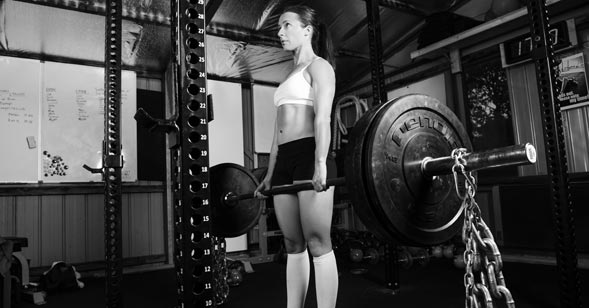5 Reasons Why Women Should Lift Heavy
Being a competitive powerlifter, I obviously have a love for lifting heavy weights and being a personal trainer, I love to share this love with my clients, especially women who before training with me would never have thought about giving it a go.
There is still a widely held myth that lifting heavy weights will make women bulky, however that is far from the truth! Women cannot naturally produce as much testosterone (one of the main hormones responsible for increasing muscle size) as males do.
Heavy lifting has many benefits and can help you reach your goals - whether it is to lose weight, tone up or increase your confidence! I incorporate heavy lifting into many of my client training programs and PT sessions, not because of my personal love for it, but because it helps in getting them results.
Here are my 5 top reasons why women should lift - and lift heavy!
1. Build strength
This is a fairly obvious one. Lifting weights will make you stronger. However movements like deadlifts and squats will help improve your functional strength capabilities, which means everyday activities will get easier over time. You won’t need to call on extra help to move furniture or carry your suitcase. With heavy weight training you will develop the self-sufficiency to do these and other tasks yourself. I was even asked last weekend by my husband to help move a heavy washing machine, and it felt great to be asked (and I could move it!).
Heavy lifting can also teach you how to move weight safely, so you are less likely to injure yourself when taking on ambitious tasks.
Also, if you play sport, even just socially on the weekends, the extra strength may also lower your chance of injury.
2. Burn more calories
A couple of years ago I did a post on Why Traditional Weight Loss Methods Don’t Work. This post outlined the role of excess post-exercise oxygen uptake (EPOC) after strenuous exercise (including heavy lifting) and the body’s elevated level of calorie expenditure after such exercise.
What EPOC shows is that you may burn more calories during an hour-long cardio class than if you lift weights for an hour, but research shows that you continue to burn more calories for hours after a lifting session, allowing you burn more calories overall.
Lifting weights burns more calories then what a lot of people think. In 2006 a study published in The Journal of Strength and Conditioning Research showed that the combination of aerobic calorie expenditure during exercise, EPOC and muscle lactate metabolism all contribute to overall calorie expenditure. This means that weight training (which uses EPOC and muscle lactate metabolism) resulted in a signifigant increase in total energy expenditure as compared with aerobic only expenditure.
This effect is magnified when you increase the weight. A 2002 study published in the journal Medicine and Science in Sports and Exercise showed that women who lifted more weight for fewer reps (85 percent of their maximum ability for 8 repetitions) burned nearly twice as many calories during the two hours after their workout than when they did more reps with a lighter weight (45 percent of their maximum ability for 15 repetitions), again burning more calories overall.
3. Build muscle and increase your metabolism
Pushing yourself with weight training will not only increase your metabolic rate hours after you stop exercising, the increased muscle mass developed from this type of training will increase your metabolic rate.
A 2007 study published in the American Journal of Clinical Nutrition found that two years of regular strength training prevented pre-menopausal women from gaining extra belly fat and helped them maintain a lower body-fat percentage than women who did no strength training.
From the age of 35 the body starts to lose muscle mass at a rate of approximately 0.5% each year, and by the time we are 60 years of age, that percentage increases. Unfortunately a loss of muscle mass leads to a slower metabolism. You can fight this loss through strength training.
4. Bone strength
Strength training not only helps your metabolism, it is also the best option for adults to increase their bone density. A regular program of high load (60 - 85% percent of their maximum ability for 1 repetition), training three or more times per week has been shown to significantly increase bone density, even in elderly adults.
And with women more prone to developing osteoporosis, it’s even more pertinent to start lifting weights!
5. Self confidence
Lifting heavy weights doesn’t just have physical benefits. Being able to lift something you previously thought you could never do, or even attempt to do, helps build confidence and self esteem. Being a physically strong woman is liberating!
I have many female clients who are now lifting weights that they never even imagined that they could do. And breaking their own personal bests when they attempt new lifts inspires them to keep at it and to keep working hard.
Weight training historically has been predominately a male domain, but with more women seeing the benefits of lifting heavy, the tide is hopefully turning.

